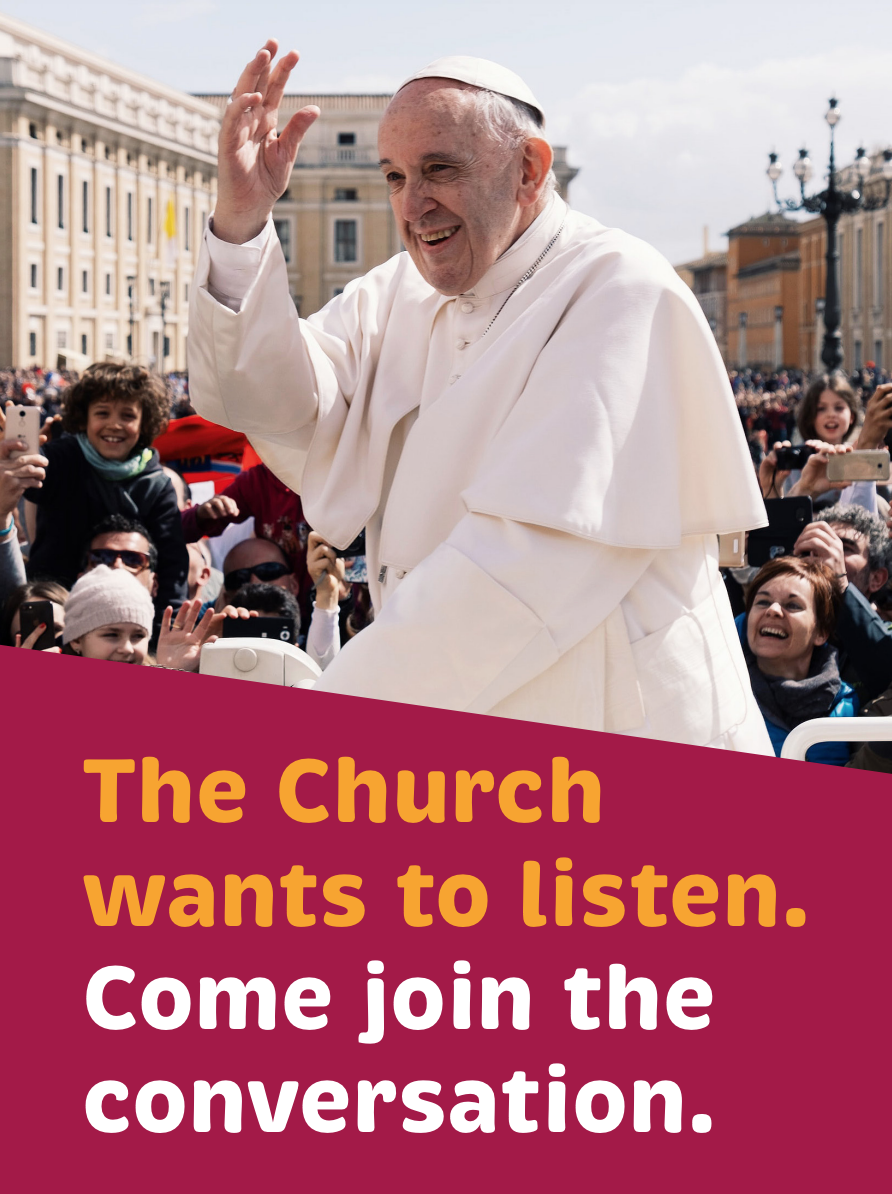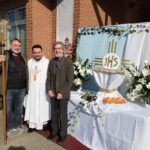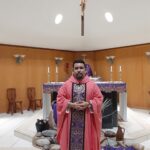The Church of God is convoked in Synod
With this convocation, Pope Francis invites the whole Church to question itself on synodality: a decisive theme for the life and mission of the Church.
SYNOD RESPONSES FINAL COMPILATION


TOPIC 1: Looking back and looking forward, what helps or prevents you from being active in the Church’s mission?
HELPS
- Feeling welcome, a sense that everyone is recognized and uniquely special as a child of God
- Opportunities for prayer and personal reflection in a spiritually sound environment led by empathetic pastors and church leaders.
- Participating in and having easy access to the sacraments, and to faith-based programs ……. in person, on-line, in groups or singly.
- Opportunities to perform the corporal works of mercy.
- Visible support for the Catholic family, from birth, through life, to death.
- Being a member of a world-wide active church
- Being thanked
PREVENTS
- Feeling an imposed sense of guilt for the long ago past, a continual sense of being under scrutiny and being judged, as opposed to being loved, reconciled, and forgiven for one’s lack of perfection
- Inadequate understanding of the dogma and associated ritual of the church and an associated sense of inadequacy, and how all this relates to the world around us today
- Feeling like a stranger; no one asked me!
- Modern society is so antithetical to the Christian truth, abetted by much of the media, so – fear
- “Everyone” is so busy/distracted/fearful/lazy/restricted by age or health or just laziness.
TOPIC 2: What areas of the Church’s mission are we missing or neglecting?
- The church needs to focus on evangelizing parishioners of all ages, so they have a personal encounter and relationship with Jesus (Baptism in the Holy Spirit).
- The church also needs to focus on building community and connection through smaller groups (ex. house-based Bible studies) and being a welcoming community to draw people into the faith.
- Ongoing adult catechesis, Bible studies, and Theology of the Body are needed, as well as direction to the wealth of available online resources.
- Outreach to young adults and young families is needed.
- Youth/adolescents need to be invited to become more involved in the Mass (readings, offertory, music, etc.). Children’s Liturgy is needed for the very young.
- The local parish needs to intentionally reach out more to the poor and to those living on the margins and peripheries of society.
Minority Report
- Social media should be used to evangelize and to exemplify the positives the church has done historically and is doing in the present.
- The long process of becoming a Catholic discourages many.
- More transparency is needed in the parish regarding the finances and the workings of the parish council. Avenues should be available for parishioners to have a say and to implement change.
- More focus on tradition is needed.
- Women need to be encouraged to become more involved in the church.
- The church places too much emphasis on abstract moral issues instead of being a loving, merciful and inviting church to all people. A “field hospital” does not turn anyone away, including those with different sexual orientations or those who have transgendered.
TOPIC 3: What particular issues in the Church’s mission do we need to pay more attention to?
- Strong liturgies with relevant homilies
- Christian unity/ecumenism
- Better management of finances and fiscal transparency
- Sexual abuse scandals by priests, financial scandals, and power abuses
- Attention to vocations
- Reviews of parish priests/challenging clericalism and church hierarchy
- Regenerating our ministries after Covid
- Reaching out to children, grandchildren, fallen away Catholics
- Evangelization
- Retaining and inspiring youth and young adults
- Better catechesis/apologetics/human formation for all ages
Minority Report
- Being smarter, more honest with our use of media
- Ending celibacy for clergy
- Inclusivity and communicating with parishioners more effectively
- Need groups intended for everyone, that are also intended for fun, socialization, and support
- Not moving priests so often and ensuring at least one priest clearly speaks the predominant language of the parish
- The breakdown of families
- Spousal/child abuse
- Mental health
- Support for those in relationship with people who suffer from addictions
- Reaching out to the marginalized/the homeless
- The Aboriginal Issue
TOPIC 4: What particular issues in society do we need to pay more attention to?
- Life and death issues (Abortion, contraception, euthanasia): why do we believe what we do? How do we approach these issues pastorally? Many feel confused about the morality involved. Is there room for gray areas?
- Social issues not being addressed appropriately in our wealthy western society: poverty, homelessness, mental health, addiction, violence, pornography, justice (especially worker exploitation), loneliness.
- Identity and lifestyle issues: the intense focus on me in every facet of life, without the “leavening” influence of even conventional morality, a sense of “anything goes, so long as I don’t get caught”, LBGTQ issues, gender versus sex, the increasingly dominant influence of what is called “wokeism”.
- The disappearance of the conventional family with all the protections that offered to its members, from birth to death: decreasing family formation, increasing family break-up.
- Growth of the new “secular” religion (wokeism) and increasing antagonism towards the established religions in general, especially the Christian religions, and especially the Catholic churches.
- Social media, and the phenomenal growth of “virtual” communication, leading to a proliferation of misinformation, a general denial of “truth” in favour of “relativism”, and a general breakdown in real interpersonal sharing of established values in favour of “gossip”.
Minority Report
- Husbandry of the environment.
- A fairer more just distribution of the wealth of the nations.
- Increasingly dictatorial governments in the world.
- Inadequate criticism of world leaders who claim to be Catholics but are open about promoting values that are clearly not Catholic values
TOPIC 5: How can we, the local church, journey with our Indigenous brothers and sisters in a process of healing and reconciliation?
- Accept our responsibility for past wrongs, to be transparent about the past, to be repentant; show compassion, care and love
- Follow through with commitments made through the Truth and Reconciliation Commission
- Educate ourselves with regard to the true cultures and spiritualties of indigenous peoples especially in listening to their stories
- Create opportunities for parishioners to meet with indigenous people in order to move beyond stereotypes and treat all with dignity, value and worth leading to respect and love
- Continue the work that has begun with the Archdiocese
TOPIC 6: “The Synod offers us the opportunity to become a listening Church, to break out of our routine, and to pause from our pastoral concerns in order to stop and listen” (Pope Francis). From this time of listening, can you sum up in one or two sentences how the Holy Spirit is calling us to grow in “journeying together” in St Ann’s Parish?
- The Synodal process has brought people together in the Church, inspired by the Holy Spirit, and ways should be found to prolong and widen this, perhaps by encouraging parishioners at Mass to extend a welcome to each other before Mass, and getting together regularly in smaller groups (e.g. Praise and Worship, Mums for mums, etc). Find new ways of staying in touch, and truly look out for each other.
- Improve communications among the people of God, especially to promote that Catholic Christianity is about developing a loving relationship with God through the sacraments, as opposed to an academic, somewhat ascetic, doctrinal approach; enable an atmosphere where people truly can listen to the Holy Spirit in their lives.
Minority Report
- Clericalism needs to be discouraged; there is no “hierarchy of the spirit” among the children of God.
- The Church should les secretive about its financial and temporal plans and activities









